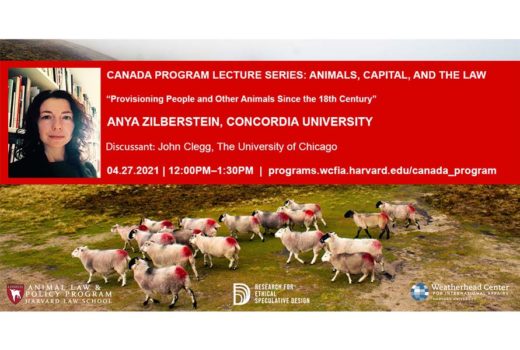Lectures & Panels Provisioning People and Other Animals Since the 18th Century

This webinar explores the interlinked history of food for people and for other animals presages several key features of industrial food and agriculture—from routine uses of laboratory animals as model organisms for human nutrition experiments to the ubiquity of corn and soy derivatives in processed foods formulated for human consumption and as farmed animal fodder.
Event Overview
Anya Zilberstein (Concordia University)
Discussant: John Clegg (The University of Chicago)
It is generally assumed that the first feedlots date to the late nineteenth century, but the rationale, practice, and debate on providing fodder to livestock in year-round confinement emerged much earlier in Europe and the colonial Americas on dairy, ranching, and breeding farms. In the eighteenth-century British empire, moreover, interest in new methods of feeding livestock contributed to broader policy and legislative debates about reforms to food welfare for destitute or dependent people such as orphans, sailors, hospital patients, prisoners, and the enslaved. These efforts culminated in statutes such as the Leeward Islands’ Amelioration Act of 1798 and Britain’s New Poor Law of 1834. Jeremy Bentham, Benjamin Franklin, Thomas Malthus, and many others argued that dietary reformers should follow the lead of innovative husbandmen who minimized the expense of feeding their non-human charges. Even the same kinds of foods (mostly starchy vegetables such as potatoes, maize, barley, and oats) and their preparation for cattle, sheep, and horses, it was thought, could be used to provision low-status people. This interlinked history of food for people and for other animals presages several key features of industrial food and agriculture—from routine uses of laboratory animals as model organisms for human nutrition experiments to the ubiquity of corn and soy derivatives in processed foods formulated for human consumption and as farmed animal fodder.
Please register here: https://harvard.zoom.us/webinar/register/WN_Q8z35WC6Sz2GqLmUHq8JtQ
Animals, Capital, and the Law
The purpose of this webinar series, co-sponsored by Harvard’s Animal Law & Policy Program, Research for Ethical Speculative Design and Harvard’s Weatherhead Center for International Affairs, is to highlight new and creative research in the growing field of animal studies. This series will emphasize how Canadian scholars, jurists, and writers have played a disproportionately influential role in the development of this interdisciplinary subject. Ranging from Sue Donaldson’s and Will Kymlicka’s Zoopolis and Nicole Shukin’s Animal Capital through to Margaret Atwood’s Oryx and Crake, Canadians have broadened how we should think about our fraught relationship to other species. Moreover, the Canadian legal system has had to rule on contentious cases related to animal ethics, such as R. v. Krajnc (2017), and will soon have to evaluate Ontario’s new ‘ag-gag’ laws. This series, sponsored by the Canada Program at the Weatherhead Center for International Affairs and Harvard’s Animal Law & Policy Program, will host a monthly online lecture during the spring term. Each 40-minute talk will be followed by a ten minute critique by an invited discussant, to be followed by a Q+A with the audience.
All Webinars will be held during the last Tuesday of each month and run from 12-1:30 p.m. Registration is required for each event.
